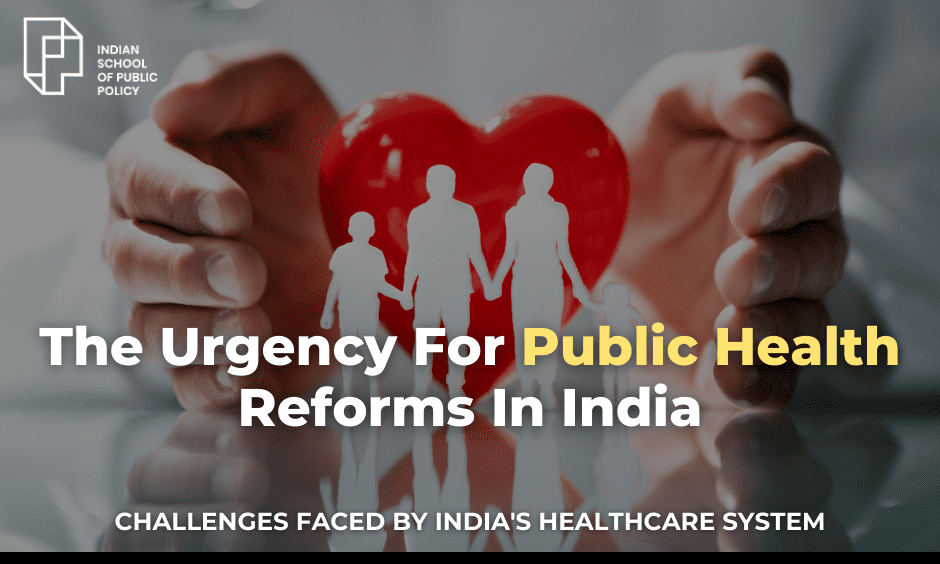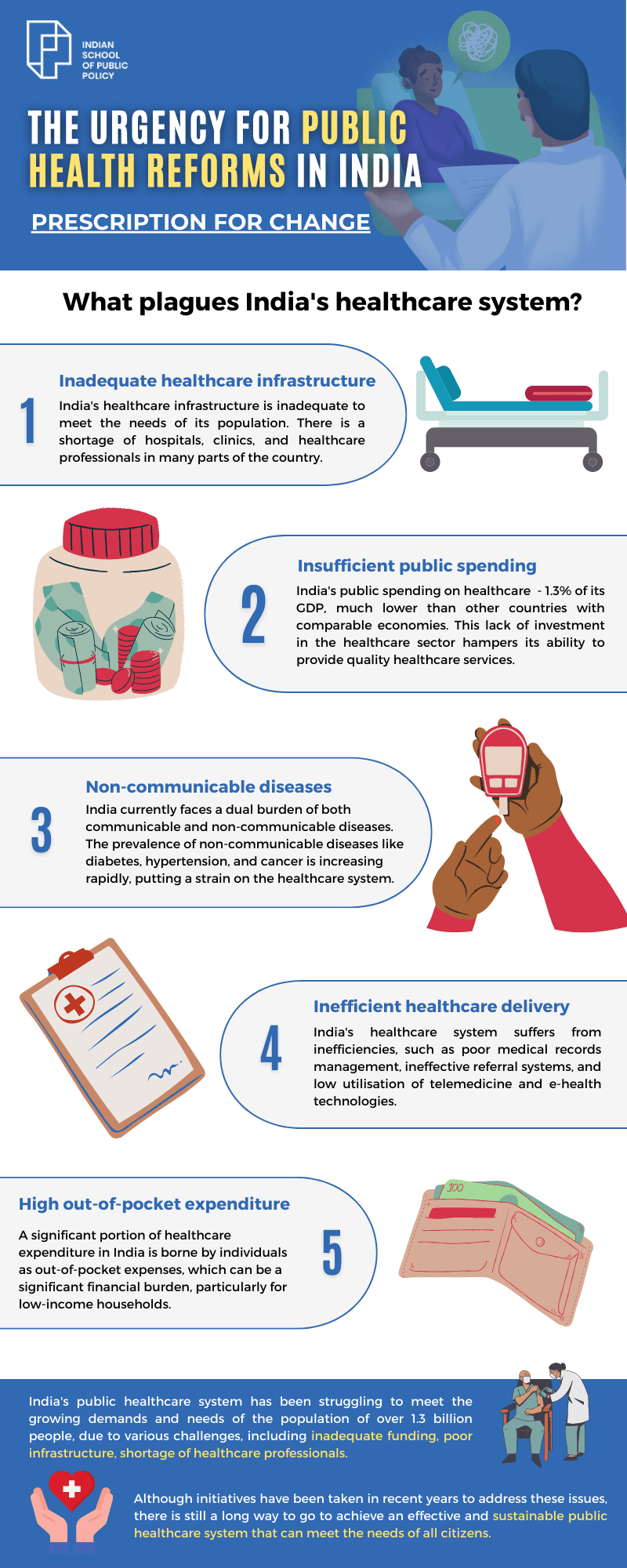
The Urgency For Public Health Reforms In India

India has a population of over 1.3 billion people, and providing healthcare to such a massive population is a daunting task. The country’s public healthcare system has been struggling to meet the growing demands and needs of the population due to various challenges, including inadequate funding, poor infrastructure, shortage of healthcare professionals, and limited access to healthcare services in rural areas. Additionally, the COVID-19 pandemic has further highlighted the gaps and shortcomings in the healthcare system, underscoring the need for urgent reforms to strengthen and improve the public healthcare policy in India. Although initiatives have been taken in recent years to address these issues, there is still a long way to go to achieve an effective and sustainable public healthcare system that can meet the needs of all citizens.
The Challenges
India’s healthcare system faces several challenges that hinder its ability to provide adequate healthcare services to its large and diverse population. Some of the critical challenges are –
Inadequate healthcare infrastructure – India’s healthcare infrastructure is insufficient to meet the needs of its population. There is an acute shortage of hospitals, clinics, and healthcare professionals in many parts of the country.
Insufficient public spending on healthcare – India’s public spending on healthcare is only about 1.3% of its GDP, much lower than other countries with comparable economies. This lack of investment in the healthcare sector hampers its ability to provide quality healthcare services.
Unequal access to healthcare – Healthcare access in India is uneven, with rural areas and economically disadvantaged communities having limited access to quality healthcare. This results in disparities in health outcomes across different regions and socio-economic groups.
Poor quality of care – The quality of healthcare services in India is often substandard, with inadequate infrastructure, a lack of trained healthcare professionals, and outdated medical equipment.
Non-communicable diseases – India currently faces a dual burden of both communicable and non-communicable diseases. The prevalence of non-communicable diseases like diabetes, hypertension, and cancer is increasing rapidly, putting a strain on the healthcare system.
Inefficient healthcare delivery – India’s healthcare system suffers from numerous inefficiencies, such as poor medical records management, ineffective referral systems, and low utilisation of telemedicine and e-health technologies.
High out-of-pocket expenditure – A significant portion of healthcare expenditure in India is borne by individuals as out-of-pocket expenses, which can be a substantial financial burden, particularly for low-income households.
Benefits of Investing
Investing in public health in India can bring numerous benefits, including:
- Improved Health Outcomes – Adequate investment in public health can lead to better health outcomes for the population, such as reduced mortality rates, improved life expectancy, and decreased incidence of preventable diseases.
- Reduced Healthcare Costs – When the focus is on preventive healthcare measures, it can significantly reduce the cost of treating chronic diseases and other health conditions, which account for a significant portion of healthcare expenditures.
- Economic Growth – Healthy populations are more productive and can contribute more to economic growth. Good health allows people to work and contribute to the economy and reduces household financial burdens due to healthcare expenses.
- Improved Social Equity – A robust public health system can help address health inequalities and disparities among different sections of the population, which is crucial for creating a more equitable society.
- Enhanced Preparedness for Emergencies – A well-funded and robust public health system can help prepare for emergencies such as pandemics, natural disasters, and bioterrorism.
Investing in public health can tremendously help India achieve sustainable development goals, reduce the disease burden, and improve the quality of life for its citizens.
Role of ISPP’s PGP-PP
The Indian School of Public Policy (ISPP), established in 2018, aims to provide a world-class education in public policy and management in India. It offers a one-year, full-time, flagship Postgraduate Programme in Public Policy, Design & Management. The curriculum at ISPP is designed to provide students with a comprehensive understanding of policy-making processes and challenges in India and worldwide. The programme combines theoretical learning with practical training, including case studies, simulations, and internships with leading public policy organisations. Students also have the opportunity to engage with policymakers, academics, and experts through guest lectures, workshops, and seminars.
ISPP focuses on creating a new generation of policy leaders who can drive meaningful change in India and beyond. It aims to foster a culture of innovation, collaboration, and social responsibility among its students and alums.
In its PGP-PP, ISPP integrates classroom learning, application, skill building, and leadership and management training consisting of foundation, core, and supporting courses. During their tenure at ISPP, scholars will opt for any 3 specialisations out of the ones listed below, which the country might grapple with as it transforms into a more evolved society.
- Education
- Environment
- Health
- National Security
- Technology
- Urbanisation
- Law, Public Policy, And Regulation
- Infrastructure
A combination of lectures and assignments will improve the scholars’ understanding of key policy issues in their chosen domain.
Register your Interest to Study at ISPP



